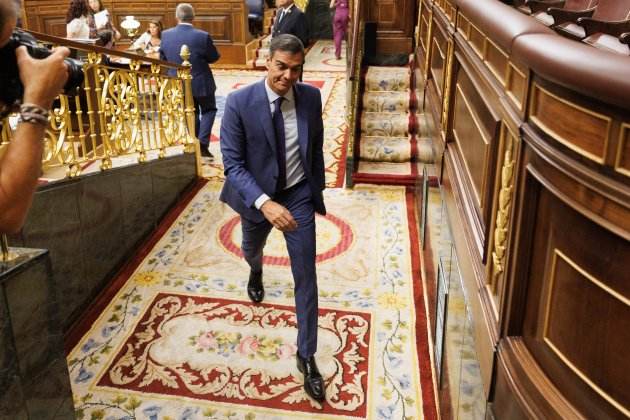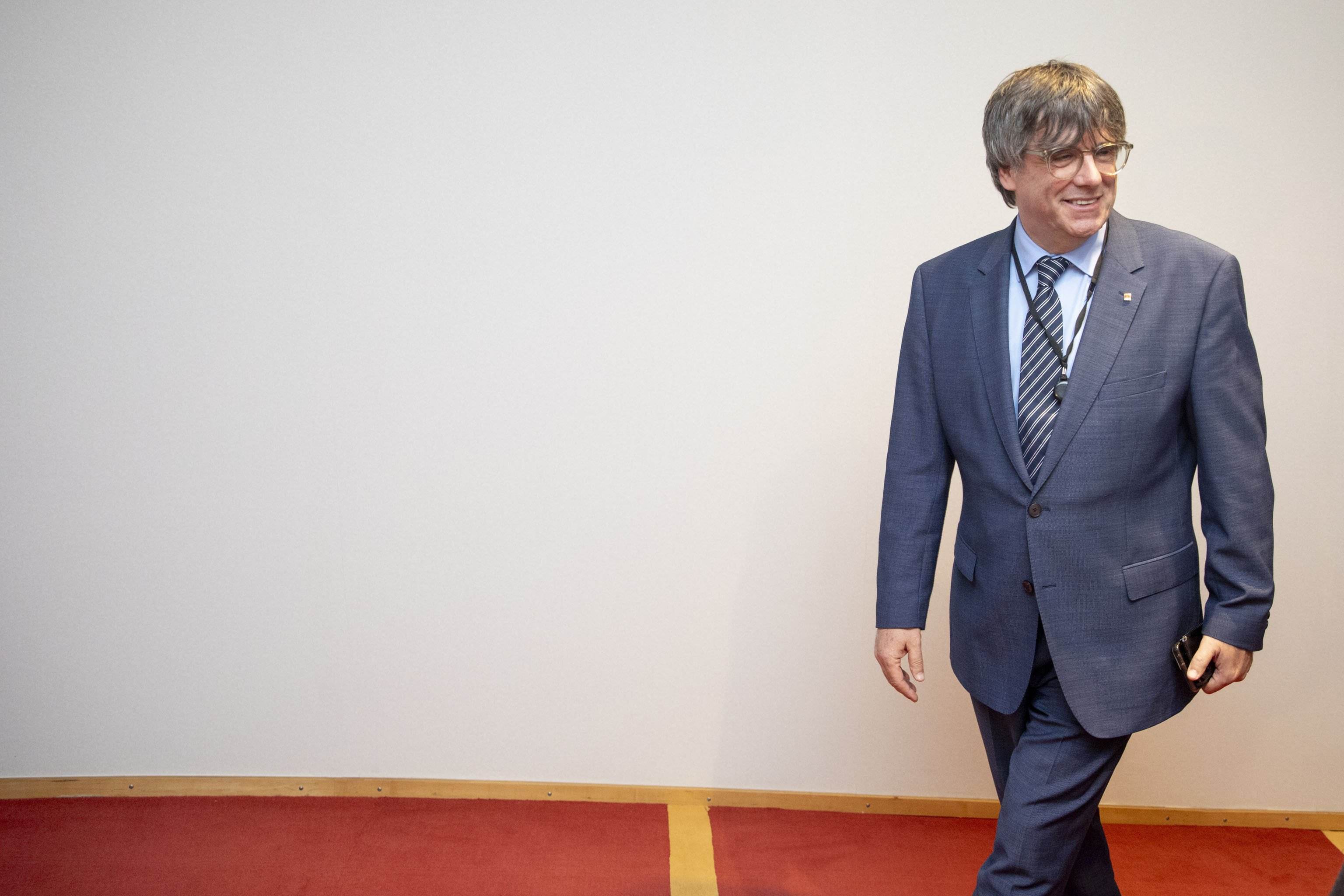In Madrid, the uncertainty about how Together for Catalonia (Junts) was moving presaged a frantic and diabolical Thursday morning to elect the speaker and Bureau of Spain's Congress of Deputies. The journalists predicted high tension and strong emotions. But the seven deputies of Junts popped the balloon at 11am when they joined the progressive bloc that emerged from the 23rd July election and voted in favour of the choice of Socialist (PSOE) candidate Francina Armengol as the new speaker, giving her a total of 178 votes (PSOE, Sumar, ERC, EH Bildu, PNV and BNG). In consequence, the aspirations of the right-wing People's Party (PP) candidate Cuca Gamarra collapsed, and she finished with 139 votes (PP, Unión del Pueblo Navarro and Coalición Canária). The PP ended up in a squabble with far-right Vox, who finished without a place on the Bureau. In short, Junts made its debut in Madrid practicing the game of politics and, with Thursday's move, gave hope to the PSOE and Sumar that Pedro Sánchez will become prime minister. The legislature is now underway, but the toughest nut is yet to be cracked: the investiture of a new government, which will require a lot of dexterity.
First, the speaker; then the investiture
Puigdemont's circles took it upon themselves to immediately downplay the impact of their positive vote for the PSOE candidate, quickly noting that the yes to Armengol does not presuppose a yes to Sánchez. They say that they are two completely different steps and cannot be mixed in any way. However, Junts's gesture does have a symbolic charge because - even if it centred on the Bureau of Congress - it is the first time that Waterloo, the capital of Catalan exile, is sitting down to play the game with the PSOE in the capital of Spain, with an agreement over the Bureau underlined by "verifiable facts". Once the session ended, Junts's spokeswoman, Míriam Nogueras, again hastened to emphasize "the principle of mistrust" that they still maintain towards the Socialists and which makes them "extremely scrupulous in negotiations". "Today there has been no conversation or negotiation regarding the investiture", replied Nogueras to clarify the separation of the two matters.
A similar attitude was projected by the Catalan Republican Left (ERC), whose votes in favour of Armengol were taken for granted, despite the attempts of the Republican spokespeople to avoid that impression. Gabriel Rufián's seven MPs insist that now "the second phase" of the negotiation begins, the prime ministerial investiture. In addition, taking advantage of the Junts agreement, ERC pointed out that negotiation with the state is "the only alternative" and they vindicated the fruits of dialogue with the state. "We will never apologize for doing politics", said the ERC spokesperson when confirming the party's pact with the Socialists.

The election of Armengol provides a breath of pure fresh air for the PSOE, raising their hopes that Pedro Sánchez can be re-invested as Spanish prime minister. He is closer to achieving it than he was on Wednesday, but it is a first and by no means definitive step: the PSOE will have to sweat blood again with Junts if it wants to stay in the Moncloa government palace. To the despair of the PP, the 178 votes for the progressive bloc made it clear that there is no alternative majority to that of Sánchez and thus Alberto Núñez Feijóo is more isolated than he thought. Yes, he has brought the Coalición Canária on board, but has also distanced himself from Vox. Feijóo, while wanting to present himself to an investiture if king Felipe VI asks him to, looked to be sizing up the opposition benches this Thursday.
Catalan language and two commissions of inquiry
The key elements of the agreements made by the Catalan pro-independence parties with the PSOE are based on the promotion of Catalan at different levels. Junts has succeeded in making the Spanish government, through foreign minister José Manuel Albares, request that Catalan, Basque and Galician be official languages in the European Union. And this will have to be debated in the European institutions on September 19th. To top it off, the PSOE has also endorsed the normalization and regularization of the use of the same three co-official languages in the Congress of Deputies, at the request of ERC and Junts. In fact, the new speaker Armengol promised to allow them from this point on, after paraphrasing Catalan poet Salvador Espriu in her inaugural speech. Now it will be necessary to see how the speaker of the Congress tackles this commitment to the use of co-official languages, while also facing the risk that there might still be no investiture.
Aside from the language debate, Junts made the PSOE commit to a commission to investigate the 2017 Catalonia terrorism attacks and, with ERC, a commission on the Pegasus espionage case. Beyond that, an amnesty for all those prosecuted in connection with the Catalan independence process will be one of the key elements up for discussion in the coming weeks. In its initial statement, ERC indicated that one of the routes to "dejudicialize the process" would be to enact an amnesty law. In the end, they ended up erasing that paragraph without specifying exactly what commitment they had secured from the Socialists. An amnesty is a vertiginous step at present.
The left dominates the Bureau and Vox is left out
The first match ball of the PSOE was focused on the need to control the Bureau of Congress and it succeeded thanks to the plurinational majority. The nine seats on the parliamentary procedural body have been allocated to the PSOE (3), Sumar (2) and the PP (4) and this means that the left will dominate the schedules and timing of parliamentary life. However, the other side of that coin is that Vox was left out, after the PP refused to lend them votes to achieve a far-right deputy speakership, as happened in the previous legislature. The disagreement between the partners on the right pours cold water on the PP-Vox relationships that have only just been established in city councils and autonomous communities across the Spanish state.
Apart from Francina Armengol as speaker, Alfonso Rodríguez de Celis (PSOE) will be first deputy speaker, José Antonio Bermúdez de Castro (PP) as second deputy speaker, Esther Gil (Sumar) will occupy the third deputy speaker spot and Marta González (PP) will be fourth. As for the secretaries, Gerardo Pisarello (Sumar) will occupy the first, Isaura Leal (PSOE) the second, Guillermo Mariscal (PP) the third and Carmen Navarro (PP) the fourth.

